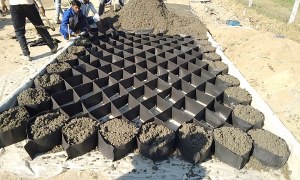🕑 Reading time: 1 minute
Contents:
Factors Affecting Strength of Concrete
Concrete strength is affected by many factors, such as quality of raw materials, water/cement ratio, coarse/fine aggregate ratio, age of concrete, compaction of concrete, temperature, relative humidity and curing of concrete.Quality of Raw Materials
Cement: Provided the cement conforms with the appropriate standard and it has been stored correctly (i.e. in dry conditions), it should be suitable for use in concrete. Aggregates: Quality of aggregates, its size, shape, texture, strength etc determines the strength of concrete. The presence of salts (chlorides and sulphates), silt and clay also reduces the strength of concrete. Water: frequently the quality of the water is covered by a clause stating “..the water should be fit for drinking..”. This criterion though is not absolute and reference should be made to respective codes for testing of water construction purpose.Water / Cement Ratio
The relation between water cement ratio and strength of concrete is shown in the plot as shown below: The higher the water/cement ratio, the greater the initial spacing between the cement grains and the greater the volume of residual voids not filled by hydration products.
There is one thing missing on the graph. For a given cement content, the workability of the concrete is reduced if the water/cement ratio is reduced. A lower water cement ratio means less water, or more cement and lower workability.
However if the workability becomes too low the concrete becomes difficult to compact and the strength reduces. For a given set of materials and environment conditions, the strength at any age depends only on the water-cement ratio, providing full compaction can be achieved.
The higher the water/cement ratio, the greater the initial spacing between the cement grains and the greater the volume of residual voids not filled by hydration products.
There is one thing missing on the graph. For a given cement content, the workability of the concrete is reduced if the water/cement ratio is reduced. A lower water cement ratio means less water, or more cement and lower workability.
However if the workability becomes too low the concrete becomes difficult to compact and the strength reduces. For a given set of materials and environment conditions, the strength at any age depends only on the water-cement ratio, providing full compaction can be achieved.
Coarse / fine aggregate ratio
Following points should be noted for coarse/fine aggregate ratio:- If the proportion of fines is increased in relation to the coarse aggregate, the overall aggregate surface area will increase.
- If the surface area of the aggregate has increased, the water demand will also increase.
- Assuming the water demand has increased, the water cement ratio will increase.
- Since the water cement ratio has increased, the compressive strength will decrease.
Aggregate / Cement Ratio
Following points must be noted for aggregate cement ratio:- If the volume remains the same and the proportion of cement in relation to that of sand is increased the surface area of the solid will increase.
- If the surface area of the solids has increased, the water demand will stay the same for the constant workability.
- Assuming an increase in cement content for no increase in water demand, the water cement ratio will decrease.
- If the water cement ratio reduces, the strength of the concrete will increase.

- For a given workability an increase in the proportion of cement in a mix has little effect on the water demand and results in a reduction in the water/cement ratio.
- The reduction in water/cement ratio leads to an increase in strength of concrete.
- Therefore, for a given workability an increase in the cement content results in an increase in strength of concrete.
Age of concrete
The degree of hydration is synonymous with the age of concrete provided the concrete has not been allowed to dry out or the temperature is too low. In theory, provided the concrete is not allowed to dry out, then it wil always be increasing albeit at an ever reducing rate. For convenience and for most practical applications, it is generally accepted that the majority of the strength has been achieved by 28 days.Compaction of concrete
Any entrapped air resulting from inadequate compaction of the plastic concrete will lead to a reduction in strength. If there was 10% trapped air in the concrete, the strength will fall down in the range of 30 to 40%.Temperature
The rate of hydration reaction is temperature dependent. If the temperature increases the reaction also increases. This means that the concrete kept at higher temperature will gain strength more quickly than a similar concrete kept at a lower temperature. However, the final strength of the concrete kept at the higher temperature will be lower. This is because the physical form of the hardened cement paste is less well structured and more porous when hydration proceeds at faster rate. This is an important point to remember because temperature has a similar but more pronounced detrimental effect on permeability of the concrete.
Relative humidity
If the concrete is allowed to dry out, the hydration reaction will stop. The hydration reaction cannot proceed without moisture. The three curves shows the strength development of similar concretes exposed to different conditions.


